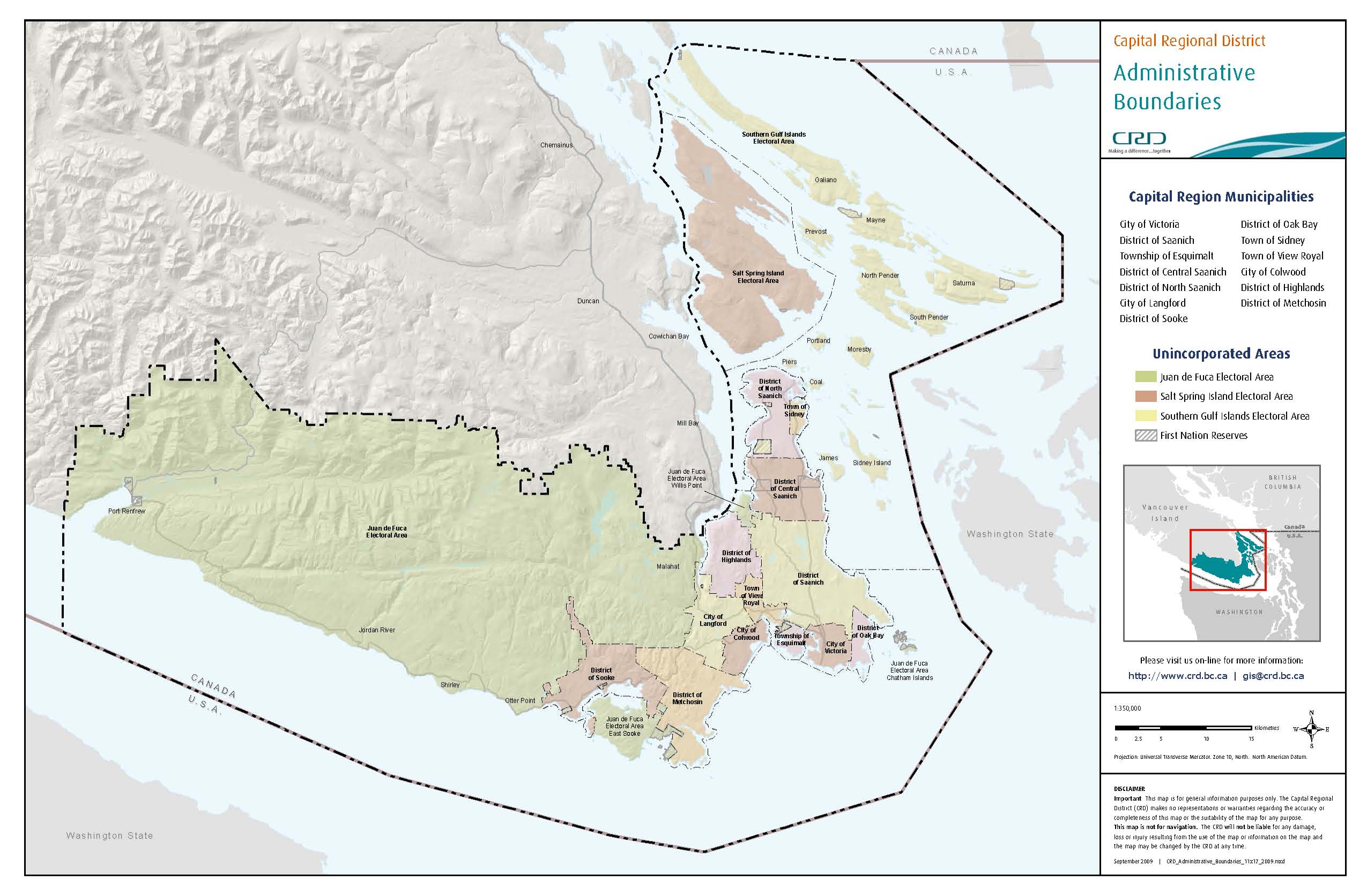Capital Regional District
Coordinated Inter-Regional Information Sharing Process
Under the umbrella of the CAVI-Convening for Action on Vancouver Island initiative, the Capital Regional District (CRD) and three other regional districts are aligning their efforts to advance an Inter-Regional Education Initiative. The initiative supports implementation of watershed-based strategies and programs.
Integrated Watershed Management
“The CRD and partner municipalities have been leaders within the CAVI initiative since 2008 – initially through participation  in the Vancouver Island Showcasing Green Infrastructure Innovation Series; and subsequently through hosting of the Bowker Creek Forum as an inter-regional ‘sharing and learning’ event in February 2010. More recently, the CRD was an integral part of the provincial pilot Course on the ISMP Course Correction, held in November 2011,” states Kim Stephens, Executive Director of the Partnership for Water Sustainability in BC.
in the Vancouver Island Showcasing Green Infrastructure Innovation Series; and subsequently through hosting of the Bowker Creek Forum as an inter-regional ‘sharing and learning’ event in February 2010. More recently, the CRD was an integral part of the provincial pilot Course on the ISMP Course Correction, held in November 2011,” states Kim Stephens, Executive Director of the Partnership for Water Sustainability in BC.
“The CRD is currently implementing a two-year  Integrated Watershed Management Strategy in the region’s core area; and also provides watershed protection and/or monitoring services to four other municipalities and the three electoral areas. Partnering under the CAVI umbrella will provide opportunities to better deliver on our commitments,” states Glenn Harris, Senior Manager, Environmental Protection Division.
Integrated Watershed Management Strategy in the region’s core area; and also provides watershed protection and/or monitoring services to four other municipalities and the three electoral areas. Partnering under the CAVI umbrella will provide opportunities to better deliver on our commitments,” states Glenn Harris, Senior Manager, Environmental Protection Division.
“Board support for the Inter-Regional Education Initiative enables CRD staff participation in a coordinated inter-regional information sharing process. Local governments will benefit from the information sharing between four Vancouver Island regional districts, learn from the experiences of the other regional districts, and be able to participate in workshops delivered locally and elsewhere on Vancouver Island,” concludes Glenn Harris.
About the Capital Regional District
The CRD is a local government administrative district encompassing the southern tip of Vancouver Island and the southern Gulf Islands in the province of British Columbia. The CRD had an official population of ~360,000 as of the 2011 Census.
The CRD encompasses the thirteen municipalities of Greater Victoria and the Juan de Fuca Electoral Area on Vancouver Island, the Salt Spring Electoral Area, and the Southern Gulf Islands Electoral Area. Its headquarters is in the City of Victoria.
Capital Regional District is a Champion Supporter of the Partnership for Water Sustainability
“The Champion Supporter designation is the Partnership’s way of formally recognizing government and non-government organizations that provide the Partnership with ongoing financial and/or in-kind support; and also play  a leadership role in the ‘convening for action’ initiative,” wrote Tim Pringle, President of the Partnership, in a letter to the Regional Board.
a leadership role in the ‘convening for action’ initiative,” wrote Tim Pringle, President of the Partnership, in a letter to the Regional Board.
“We are pleased to inform the Chair and Directors that the Capital Regional District is hereby deemed to be a Champion Supporter of the Partnership for Water Sustainability in British Columbia.”
“The CRD’s demonstrated commitment to achieving a shared vision for water sustainability in a local government setting is vitally important to the Partnership’s capability to carry out our mission. We have been collaborating with the CRD’s Stormwater, Harbours and Watersheds Program since 2008. We thank the CRD for being a champion for the CAVI initiative.”
Inter-Regional Education Initiative
“In 2012, Board support for the Inter-Regional Education Initiative on Rainwater Management in a Watershed Sustainability Context (IREI) enabled the Partnership to align efforts and implement the ‘proof of approach’ in collaboration with the Cowichan, Nanaimo and Comox Valley regional districts,” continues Kim Stephens.
“To close out the 2012 program, the Capital Region hosted a workshop where the Partnership unveiled the beta version of the web-based Water  Balance Model Express for Landowners. The experience gained in 2012 will inform full-scale implementation on both sides of the Georgia Basin in 2013 and beyond.”
Balance Model Express for Landowners. The experience gained in 2012 will inform full-scale implementation on both sides of the Georgia Basin in 2013 and beyond.”
“In 2013, the Partnership is facilitating an inter-regional collaborative process that will add the Metro Vancouver region to the mix. The desired outcome is inter-regional consensus on a performance monitoring framework that can be used to adjust actions and inform land use planning that maintains healthy streams in the Georgia Basin.”
“Everyone needs to agree on expectations and how all the players will work together, and after that each region and each community can reach its goals in its own way,” concludes Kim Stephens.



